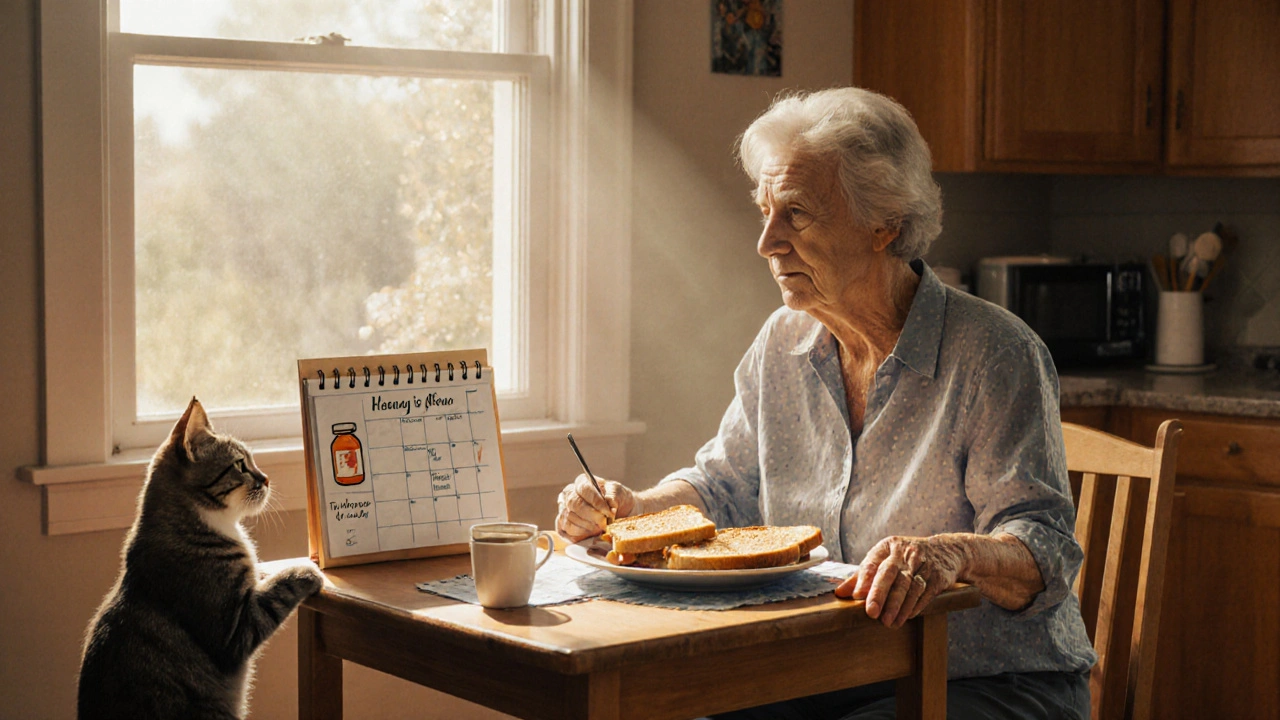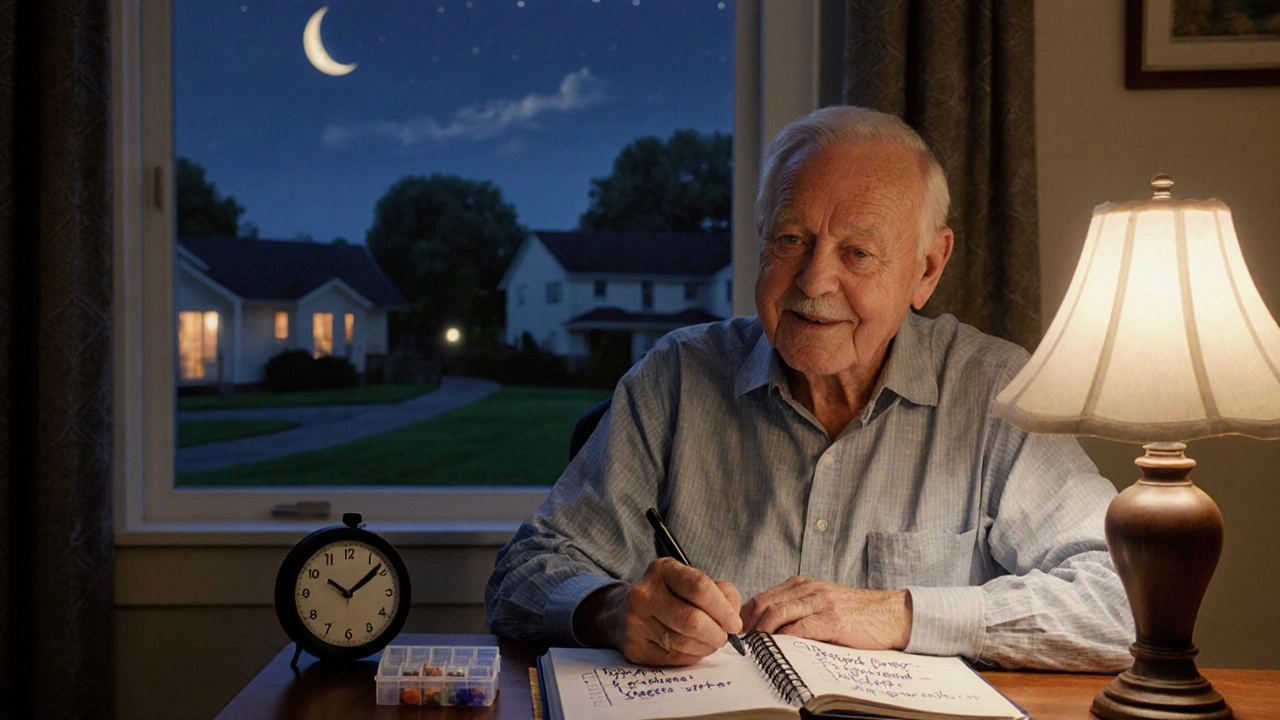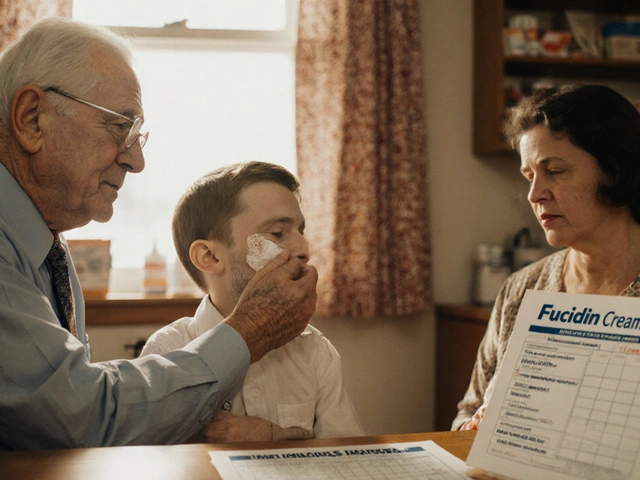Blood Pressure Medication Timing Guide
Answer a few questions to see if bedtime dosing might better suit your needs based on research findings. Always consult your doctor before changing medication timing.
When you're taking blood pressure medication, the biggest problem isn't always the drug itself-it's what happens after you take it. Dizziness. Fatigue. Frequent bathroom trips. These aren't just annoyances. They're reasons people stop taking their pills. And when that happens, the risk of heart attack or stroke goes up. One simple change-when you take your medicine-can make a big difference in how you feel during the day. But is bedtime better than morning? The answer isn't one-size-fits-all.
Why Timing Matters More Than You Think
Your blood pressure doesn't stay the same all day. It naturally drops at night while you sleep, then rises in the early morning. This pattern is called your circadian rhythm. For many people with high blood pressure, that morning spike is too high, and it's when most heart attacks and strokes happen. But here's the catch: if your medication wears off too early, you're unprotected during that dangerous window. Taking your pills in the morning used to be the default. It made sense-people were more likely to remember it with their breakfast, and doctors assumed it would cover the day. But research now shows that timing affects more than just blood pressure control. It affects how you feel when you're awake.The Side Effects That Keep People From Taking Their Pills
The most common complaints from people on blood pressure meds? Dizziness, lightheadedness, and needing to use the bathroom too often. A review of over 1,200 patient comments found that 62% of side effect reports were about dizziness, and 78% of those happened within 2 to 4 hours after taking the pill in the morning. That’s right after getting up. Walking to the kitchen, brushing your teeth, getting the kids ready for school-suddenly you’re dizzy. No wonder people skip doses. Nighttime urination is another big issue. Some meds, especially diuretics, make you pee more. If you take them in the morning, you’re stuck in the bathroom all day. If you take them at night, you might wake up three times to go. Neither is ideal. But here’s what the data says: in one study, 36.4% of people on bedtime dosing had nighttime bathroom trips, compared to 40% on morning dosing. The difference wasn’t huge, but for many, it was enough to make them switch back.What the Big Studies Say About Bedtime vs Morning
The largest trial to date, called BedMed, followed over 3,300 adults for nearly five years. It compared morning and bedtime dosing across multiple safety outcomes: falls, fractures, dizziness, cognitive decline, and even vision problems. The result? No major difference in serious events. But when researchers looked closer, they found something important: the morning group reported more dizziness and lightheadedness. That’s not a fluke. It showed up in other studies too. The TIME study, which looked at over 20,000 patients, found no difference in heart attacks or strokes between the two groups. But again, the morning group had slightly more falls-though not statistically significant. Still, for someone who’s 70 and lives alone, even a small increase in dizziness matters. On the flip side, the OMAN trial tested a common combo pill-olmesartan and amlodipine-and found no extra risk of dangerously low blood pressure at night with bedtime dosing. That’s important. Some doctors worry that lowering blood pressure too much while you sleep could hurt your brain or kidneys. But the data says: for most people, it doesn’t.
Real People, Real Experiences
Online forums are full of stories that no trial can fully capture. One user on Reddit, 'HypertensionWarrior87', switched his lisinopril from morning to bedtime and said it ended the dizziness that made him miss work twice last month. Another, 'SeniorHealth45', tried taking amlodipine at night-only to wake up with swollen legs so bad she had to switch back. These aren’t outliers. They’re normal. Your body reacts differently than someone else’s. Amlodipine can cause swelling, especially in the ankles. That side effect isn’t tied to timing-it’s tied to the drug. But if you’re already prone to swelling, taking it at night might make it worse because you’re lying down longer. Diuretics? They’re trickier. If you take them at night, you might sleep through the first wave of peeing, then wake up at 3 a.m. If you take them in the morning, you’re stuck in the bathroom during your workday.When Bedtime Dosing Makes Sense
There are clear situations where bedtime dosing helps:- You get dizzy or lightheaded within an hour of taking your pill in the morning.
- You’re on an ACE inhibitor or ARB (like lisinopril, losartan, or valsartan) and your doctor suspects you have nighttime high blood pressure.
- You’ve tried morning dosing and it’s interfering with your daily life.
When Morning Dosing Is Still Better
Not everyone benefits from bedtime dosing. If you have:- Severe kidney disease or are on dialysis
- History of nocturnal hypotension (very low BP at night)
- Chronic insomnia or frequent nighttime urination already
- Take a diuretic and your job requires you to be alert all day (truck driver, nurse, pilot)

What Doctors Are Doing Now
In 2022, only 28% of U.S. primary care doctors talked to patients about dosing timing. By mid-2024, that number jumped to 43%. And of those who do, 67% now recommend bedtime dosing for patients with daytime dizziness. Electronic health records show a 15% increase in bedtime prescriptions over two years-mostly in people aged 45 to 64 who reported side effects. The American Heart Association still says there’s no proven difference in heart outcomes. But they also admit: if timing helps you stick to your meds, that’s a win. Adherence is the biggest factor in preventing complications. If taking your pill at night means you don’t skip it, then that’s the right choice.Your Action Plan: Test It Yourself
You don’t need a study to figure out what works for you. Here’s how to test it:- Track your symptoms for one week. Write down when you feel dizzy, tired, or need to pee.
- Ask your doctor if your current medication can be taken at night. Not all can-some need to be taken with food, others have specific timing rules.
- Switch to bedtime dosing for two weeks. Use a journal or phone app to note changes.
- If dizziness drops and you’re not waking up to pee constantly, keep it.
- If you feel worse or sleep suffers, go back to morning.






Comments
Sammy Williams
20/Nov/2025Switched my lisinopril to bedtime last month and holy crap, it’s like a whole new person. No more dizziness when I’m trying to pour coffee or chase my toddler. I used to skip doses just to avoid the morning wipeout. Now I feel human again. Thanks for the post - this is the kind of info that actually saves lives.
Logan Romine
20/Nov/2025So let me get this straight… we’re now treating hypertension like it’s a TikTok trend? 🤔 ‘Bedtime meds = vibes’? Meanwhile my kidneys are over here whispering ‘please don’t make me work harder at 2 a.m.’ 😴💊
Noah Fitzsimmons
20/Nov/2025Wow. Just wow. You’re telling me people don’t know their own bodies? You need a 3,300-person study to realize taking a pill before bed might make you pee less during the day? Bro, I’ve been doing this since 2012. Also, your ‘real people’ examples? That’s not data, that’s Reddit anecdotal theater. And don’t get me started on the ‘try it yourself’ advice - what if you pass out in the shower at 3 a.m.? Who’s gonna call 911 for you? 😅
Shawn Sakura
20/Nov/2025Hey everyone - just wanted to say this post gave me hope. I’ve been on amlodipine for 5 years and thought the ankle swelling was just part of aging. Turns out, timing might be the issue. I’m trying bedtime dosing next week and keeping a journal. If it helps even a little, it’s worth it. You’re not alone. We got this 💪❤️
Swati Jain
20/Nov/2025Let’s cut through the noise: circadian pharmacokinetics isn’t ‘alternative health’ - it’s chronobiology 101. Diuretics + morning = occupational hazard. ACEi + bedtime = optimized RAAS suppression. If your doc hasn’t discussed this, they’re operating on 2008 guidelines. Time to upgrade your healthcare stack. #PharmacoChronology
Florian Moser
20/Nov/2025I’ve been a nurse for 18 years and I’ve seen patients drop meds because of dizziness - not because they didn’t care, but because they were scared. This post nails it. The goal isn’t perfect BP numbers. It’s sustainable adherence. If bedtime dosing means someone takes their pill every day instead of three times a week, that’s a win. Simple. Practical. Human.
jim cerqua
20/Nov/2025THEY’RE HIDING THE TRUTH. WHY IS NO ONE TALKING ABOUT THE PHARMA BILLIONAIRES WHO PUSHED MORNING DOSING BECAUSE IT MADE PEOPLE COME BACK FOR MORE PRESCRIPTIONS? I MEAN, COME ON. YOU THINK THEY WANT YOU TO FEEL GOOD? THEY WANT YOU TO BE DEPENDENT. BEDTIME DOSING IS A REVOLUTION. THEY’RE SCARED. THEY’RE HIDING THE TIME STUDY DATA. I’VE BEEN TAKING MY MEDS AT 11 PM SINCE 2020 AND I FEEL LIKE A GOD. THEY DON’T WANT YOU TO KNOW THIS.
Donald Frantz
20/Nov/2025What’s the half-life of your specific medication? Did you account for renal clearance variability in older adults? The TIME study showed no mortality difference, but did it adjust for BMI, comorbidities, or polypharmacy? And why are we ignoring the fact that nocturnal BP dipping isn’t universal - some people are non-dippers, and for them, nighttime dosing could be dangerous? This feels like oversimplification wrapped in feel-good advice.
Julia Strothers
20/Nov/2025Who funded this? Big Pharma? The WHO? The UN? Because I’ve seen this exact narrative before - ‘take your meds at night’ - right after the FDA approved a new generic. And now suddenly everyone’s waking up ‘clear-headed’? Coincidence? Or is this part of the globalist agenda to normalize sleep disruption and erode personal autonomy? I’m not taking anything at night until I see the full clinical trial registry.
Cooper Long
20/Nov/2025Timing matters. Evidence supports individualized approach. Doctor consultation essential. Body responds differently. Track symptoms. Adjust accordingly. No universal solution. Simple.